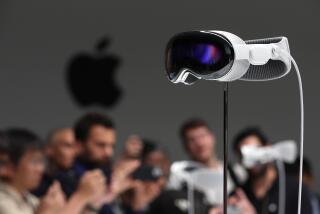Will Apple’s Web Strategy Bear Fruit?
Whether or not you Web-surf much, take note: The Internet doesn’t care whether you use Macintosh, Windows or a Dick Tracy wristwatch. And as the Net increasingly drives sales of computers, how companies adapt to it may dictate their future. So if you like the Mac, you should care deeply about the quality of Apple’s Net strategy.
Has Apple put forward a plausible plan for making the Mac a superior Internet machine? Let’s take a look at its key elements:
*
* Strategy 1: Make the Net easy.
By early 1997, every Mac that Apple sells will be Internet-ready.
Apple plans to integrate Internet tools into the Mac OS--breaking down the distinction between operating your Mac and going online--beginning with Cyberdog, a set of tools that browse, search and manage mail, files and Web multimedia. (You can download it from https://cyberdog.apple.com)
Finally, Apple is working with Maxum Development to make every Mac a personal Web server by early next year, using Apple’s standard file-sharing metaphor.
Apple even helps with information overload by recommending Web sites based on a profile you register at https://myhome.apple.com. (But you’ll be giving Apple a lot of personal data, so consider your degree of privacy paranoia.)
Grade: A-. This package beats anything else available or announced. It would be an A, but I accept Mac OS-related promises strictly on a COD basis.
*
* Strategy 2: Make the Net exciting.
Apple wants to set Web multimedia on fire, just as the Mac did in other publishing realms. First, it’s been making the QuickTime family--QuickTime (for video and animation), QuickTime VR (for interactive 3D navigation of images), and QuickTime Conferencing (for video communications)--more Net-friendly.
Apple will soon ship a free QuickTime plug-in for Netscape Navigator that will be able to decode MPEG1 files--a common format for multimedia on the Net. (Check https://quicktime.apple.com in mid-November.) So QuickTime alone--without special hardware--will be able to handle the vast majority of online content.
Apple also plans to integrate Java software components directly into the Mac OS. Web masters use Java to create special visual effects and user interfaces.
Grade: B-. QuickTime is the top package for multimedia, and adopting Java reflects common sense. But Windows is catching up (or surpassing the Mac in some areas, like virtual-reality modeling) and Apple needs help from independent developers of Mac-based Web-authoring programs.
*
* Strategy 3: Make the Mac the Net leader.
Apple figures to do this by promoting cross-platform Net technologies that reflect the Mac’s strengths. It hopes to make the QuickTime Media Layer (the QuickTime family plus QuickDraw 3D, Apple’s standard for representing and displaying 3D graphics) a ubiquitous Web tool.
Apple is lobbying other companies to adopt HotSauce--its way of displaying Web sites as navigable 3D spaces. With this method, you swoop through a site like a helicopter pilot, rather than click through page after annoying page of hypertext to find that elusive chile recipe.
Apple also wants to make OpenDoc the standard for Web software. OpenDoc replaces large applications with small, specialized programs (called “parts”) that work equally well on any computer system. OpenDoc lets you copy and paste fully functional Web content into your own documents--or easily create parts for your own Web site.
Cyberdog--a collection of OpenDoc parts--demonstrates this principle, and forthcoming versions of ClarisWorks and WordPerfect will be based on OpenDoc.
Grade: C+. QuickTime is great, but it’s far from a universal standard. And while many companies have endorsed OpenDoc, Microsoft and Adobe haven’t, and OpenDoc has yet to generate many actual products. Meanwhile, Microsoft has launched a comparable, though less versatile and clumsier system called ActiveX. Uh-oh. Do I sense another great idea in danger of being steamrollered by mediocrity?
Apple will have to raise these grades. Cupertino’s R&D; building clearly shows signs of doing its homework, but so far, they’re a little weak on follow-through.
Charles Piller (cpiller@macworld.com) is senior editor at Macworld magazine.





